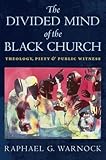The divided mind of the Black church : theology, piety, and public witness / Raphael G. Warnock.
Material type: TextSeries: Religion, race, and ethnicityPublisher: New York : New York University Press, [2014]Description: 1 online resource (xiii, 263 pages)Content type:
TextSeries: Religion, race, and ethnicityPublisher: New York : New York University Press, [2014]Description: 1 online resource (xiii, 263 pages)Content type: - 9781479864102
- 1479864102
- 277.3/08308996073 23
- BR563.N4 W37 2014eb
- online - EBSCO
| Item type | Current library | Call number | URL | Status | Notes | Barcode | |
|---|---|---|---|---|---|---|---|
 eBook
eBook
|
Biblioteca "Angelicum" Pont. Univ. S.Tommaso d'Aquino Nuvola online | online - EBSCO (Browse shelf(Opens below)) | Online access | Not for loan (Accesso limitato) | Accesso per gli utenti autorizzati / Access for authorized users | (ebsco)648167 |
Includes bibliographical references (pages 231-249) and index.
Online resource; title from digital title page (JSTOR platform, viewed April 14, 2017).
The gospel of liberation : Black Christian resistance prior to Black theology -- The gospel's meaning and the Black church's mission -- Black theologians on the mission of the Black church -- Black pastors on the mission of the Black church -- Womanist theologians on the mission of the Black church.
What is the true nature and mission of the church? Is its proper Christian purpose to save souls, or to transform the social order? This question is especially fraught when the church is one built by an enslaved people and formed, from its beginning, at the center of an oppressed community's fight for personhood and freedom. Such is the central tension in the identity and mission of the Black church in the United States. For decades the Black church and Black theology have held each other at arm's length. Black theology has emphasized the role of Christian faith in addressing racism and other forms of oppression, arguing that Jesus urged his disciples to seek the freedom of all peoples. Meanwhile, the Black church, even when focused on social concerns, has often emphasized personal piety rather than social protest. With the rising influence of white evangelicalism, biblical fundamentalism, and the prosperity gospel, the divide has become even more pronounced. The author traces the historical significance of the rise and development of Black theology as an important conversation partner for the Black church.


